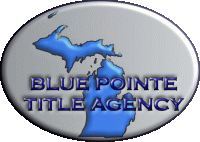Your Guide to Residential Title Insurance
- Blue Pointe Title
- Jun 10, 2022
- 3 min read
Updated: Mar 30, 2023

Buying a new home is exciting. You spend so much time daydreaming about what the future holds for your family - as well as the memories you will make there together. One thing you probably don’t ever think of is whether or not you will lose your rights to the property due to a title search defect.
That’s correct - even if you purchase your property and the deed has been recorded reflecting your right to title, your rights may still be at risk. Unless, of course, you have invested in residential title insurance.
What is Residential Title Insurance?
Residential title insurance protects you against any title defects that may arise after you purchase your property. Unlike health insurance or car insurance which offers protection from an unknown future event, title insurance protects you from what has happened before you took title to the property.
Here’s how it works:
When purchasing a home, a title search will commence. This is when experienced title agents will diligently comb through all of the public records concerning the property - all the way back to the very beginning. They look at the chain of title to confirm that the seller actually has the right to sell the property. And the search also looks for anything that may cloud the title. As a homebuyer, you want to make sure that the title is free and clear without any known issues.
After the search is done and the title has been deemed clear, you will be given the opportunity to purchase a title insurance policy confirming these results.
Common Title Defects
Once you buy a home, the previous owner conveys the title to you – giving you full legal ownership. So if there are any hidden defects or title issues, as the new owner, you get them, too. As long as the title search was successful, you shouldn’t have any concerns. But occasionally, unseen title defects can appear and threaten your rights.
A few common title defects include:
Judgments
Unpaid tax liens
Erroneous deeds
Erroneous recording of documents
Forged signatures
Missing or undisclosed heirs
Encumbrances
Encroachments
If any of these defects arise after you take ownership of the property, you will have to fight for your right to the title. This could mean an expensive legal battle and it could also potentially mean losing your home. However, if you purchased a title insurance policy, you will be able to submit a claim and go about your day without worry. Everything will be handled by the title company.
Types of Title Insurance - And Paying For It
There are two different types of title insurance - an owner’s title insurance policy and a lender’s title insurance policy.
An owner’s title insurance policy protects you as the owner. You are not required to purchase this, but it is always highly recommended due to the safety net it provides. This policy will remain with you as long as you have an interest in the property - including your heirs.
A lender’s title insurance policy, on the other hand, protects the lender. If you are taking out a mortgage on the property, the lender will often make this policy a mandatory condition of closing. They are taking a risk by giving you a loan and want to secure their place in line as the first lienholder should something go awry. A lender’s title policy only lasts until the mortgage is satisfied. This policy will not protect you.
It is important to note that title insurance policies are paid for only once - at the closing. That is one payment for each type of title insurance you decide to purchase.
Residential Title Insurance at Blue Pointe Title Agency
Before you purchase your future home, be sure you have an experienced title company on your side. After all, your title search and title insurance policy are two very important parts of a successful purchase. The experts at Blue Pointe Title Agency are here to help you through the entire process.
To learn more or to get started, contact us today at (517) 258-1511.






Comments